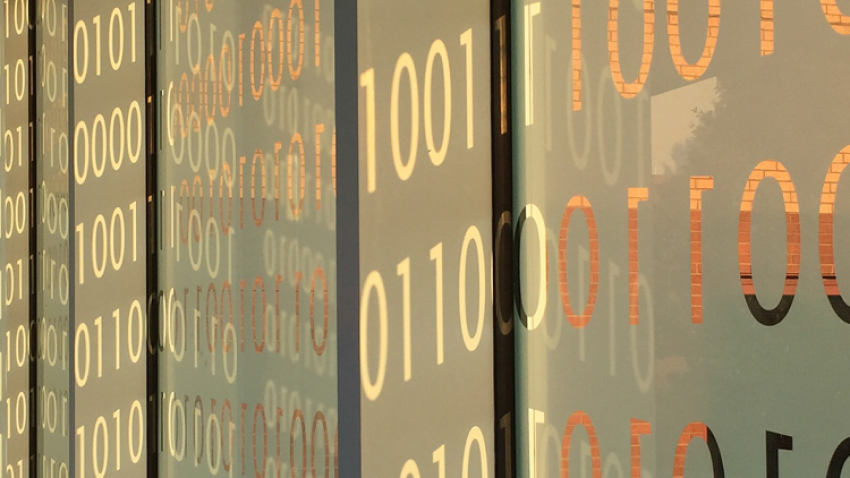
Student Puts OMSCS Knowledge to Use Creating Mind-Controllable Robotic Hand
Glenn Cameron stands in his office wearing a brain-computer interface on his head and holding a 3-D printed robotic hand. He thinks about picking up a spoon, and the hand slowly grasps the handle.
This simple touch has been years in the making, but what started as a fun hobby on vacation has now led Cameron to pursuing an Online Master's of Computer Science in Computer Science (OMSCS) degree and to aspirations of creating his own bionics company.
Finding bionics
His interest in robotics began in 2015, when he stopped by a Radio Shack on vacation and bought a robotic car kit. As a self-taught coder, Cameron discovered with a few modifications he could make the car semi-autonomous. Soon, Cameron had a car that could drive itself around his San Francisco apartment without bumping into things.
The experience made Cameron realize how basic hardware could be used to build complex semi-autonomous systems. He didn’t just want to make fun toys, though; he wanted to create things people could actually use.
Bionics were a natural fit for Cameron because he’s been wanting to help people with disabilities his whole life. In elementary school, Cameron had a friend who was born without a right hand.
“There were simple things like riding a bike that were more difficult for him than for me,” Cameron said. “I wanted to challenge myself to do something difficult and stretch my limits to make an advanced prosthetic robotic hand to help people like him.”
When he found an open source robotic hand on the internet, Cameron 3-D printed it and got started. But he learned there were many limitations to the basic software. Although he could program the hand to open and close, it couldn’t tell where its fingers were. Cameron knew he didn’t have the expertise to make it more agile, but he knew where he could find it.
“I couldn’t do complex programming, and that’s one of the reasons I enrolled in OMSCS in 2017 because I just wanted to get better,” he said.
Bridging the gap with OMSCS
Cameron focuses on interactive intelligence in the program, where he’s taken classes on computer vision and basic programming. The mix allows Cameron to build up his technical skills while also understanding how to design a product people can really use.
“Human computer interaction courses have helped me to think about how this hand would work on a real amputee,” he said.
The first two iterations of the hand used electrical motors in the base, which isn’t an ideal setup for an amputee, as Cameron learned in his classes. The third version now has streamlined motorized bases that fit easily on to an amputee’s arm.
Improving the hand
This is just one of many evolutions since the first hand he printed off the internet. Cameron has trained a standard brain-computer interface to recognize what he’s thinking and turn it into a task. The hand is better able to complete the task because it now has fingers with knuckles that can move and adapt to the shape of an object it's holding while sensing the tightness of its grip and where its fingers have moved. The next version will feature more sensors so the hand can feel what’s in its fingertips.
Each design has been self-funded with around $1,000 in parts and a small team helping Cameron code and test. The limited resources have forced him to be creative and have made the hand more accessible than other companies like NASA, whose Robonaut 2 hand cost $2.5 million to make.
Cameron has been entering his robotic hand in contests as a way of getting feedback for the project and recently won Georgia Tech’s Career, Research, and Innovation Development Conference’s online poster contest with the second version. With this feedback, he hopes to formalize his research by publishing papers.
His ultimate goal is to combine his background in software marketing with his OMSCS degree to run a bionics company or lead a team for another company.
“It’s kind of like a calling,” he said. “I enjoy working toward something good like this.”
As computing revolutionizes research in science and engineering disciplines and drives industry innovation, Georgia Tech leads the way, ranking as a top-tier destination for undergraduate computer science (CS) education. Read more about the college's commitment:… https://t.co/9e5udNwuuD pic.twitter.com/MZ6KU9gpF3
— Georgia Tech Computing (@gtcomputing) September 24, 2024


